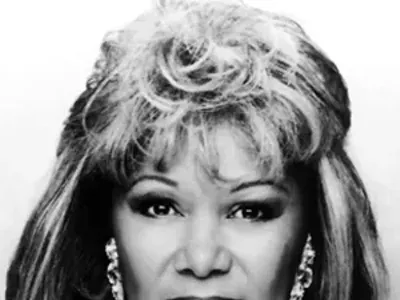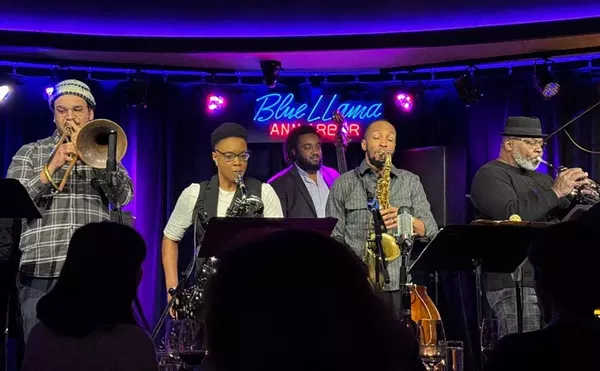A city where young hooked-on-boppers woodshedded and workshopped to become some of jazz's heaviest weights of the '50s and '60s.A city that some of today's heaviest still praise as their hometown.
A city where such grand achievements still seem underappreciated.
A city dotted with haunted clubs, where the ghosts of gigs past live on in the memories of the true fans.
Could be Detroit. Could be Philadelphia too.
"Pride, defiance and apologetics are close to the surface when one talks about jazz in Philadelphia, an underdog music in an underdog town," David R. Adler, a chronicler of the scene in the Liberty Bell city, writes in a recent issue of Philadelphia Weekly.
And a bit later he puts that Philly jazz past in perspective: "Philly is where Coltrane, McCoy Tyner, Lee Morgan, frustrated drummer Bill Cosby and so many others got their start, where clubs drew big talent, and jazz rang out from countless neighborhood bars. The older and not-so-older generations know a time when Philly's jazz-mecca status wasn't in dispute."
Substitute, say, Yusef Lateef, Barry Harris and Milt Jackson — and ignore that we don't have a failed jazz musician turned comedy star — and you could be talking about the Motor City.
Likewise, you could look at this year's festival roster and list Christian McBride and Terrell Stafford (both among Philly's under-40 stars and rising stars) alongside Detroit's James Carter and Karriem Riggins. Or, to tap an older generation, one can compare Philly cats such as Sonny Fortune, Randy Brecker and Robin Eubanks to the Detroit-rooted likes of Charles McPherson and Geri Allen.
That's not to say that it's only Detroit and Philly that bear such resemblance when it comes to the cities that acted as farm teams for the high-profile New York jazz scene of the post-World War II years – and that are playing the farm team role again today.
But it's hard not to look at the rosters of the top bands of the '50s and '60s and not think there was something special going on in particular with those two cities. A nonscientific survey finds the great Miles Davis Quintet of the '50s anchored by Detroit bassist Paul Chambers alongside the geographically obvious Philly Joe Jones on drums. No Phillyites in Davis' great '60s quintet, but again it was a Detroiter, Ron Carter, on bass.
John Coltrane's first great quartet featured his homeboys McCoy Tyner and Jimmy Garrison alongside drummer Elvin Jones, originally out of Pontiac, but claimed (and why not?) as a Detroiter. And Coltrane's final combo featured his then-wife, Alice, originally Alice McLeod of Detroit.
Over in the Modern Jazz Quartet, Philly's Percy Heath on bass and Detroit's Milton Jackson on vibes constituted half the tuxedoed breakthrough group. In Art Blakey's Jazz Messengers, Detroiters like bassist Doug Watkins and trumpeter Donald Byrd swung it, as did Philadelphians such as Jimmy Merritt and Lee Morgan.
Benny Golson and Jimmy Heath, the Philly elders in this year's festival, came up in that era with its "play-better-dig-deeper" ethos epitomized by none so much as Coltrane,, whom Golson recalled in a phone conversation the other day, was the jazz equivalent of the kid in class who got the A's with ease "while you struggled just to get a C or a B." But struggle those other jazz acolytes did.
Golson — whose signal group, the Jazztet began with Detroit trombonist Curtis Fuller in its lineup — disavows the notion that the cities where jazz took root had intrinsic influences or styles. Whether you were in Philly or Detroit or Chicago, the goal of individuality was paramount, he claims.
For those pulled by the tides of jazz, said Golson, "it was camaraderie. It wasn't just the two cities. It affected everybody across the nation with the same kind of determination to learn and to move ahead."
Much of the music Detroiters can hear downtown this week is an outgrowth of that determination — and subsequent generations of musicians emulating it — whether in Philly or the Motor City.
W. Kim Heron is editor of Metro Times. Send comments to [email protected]





